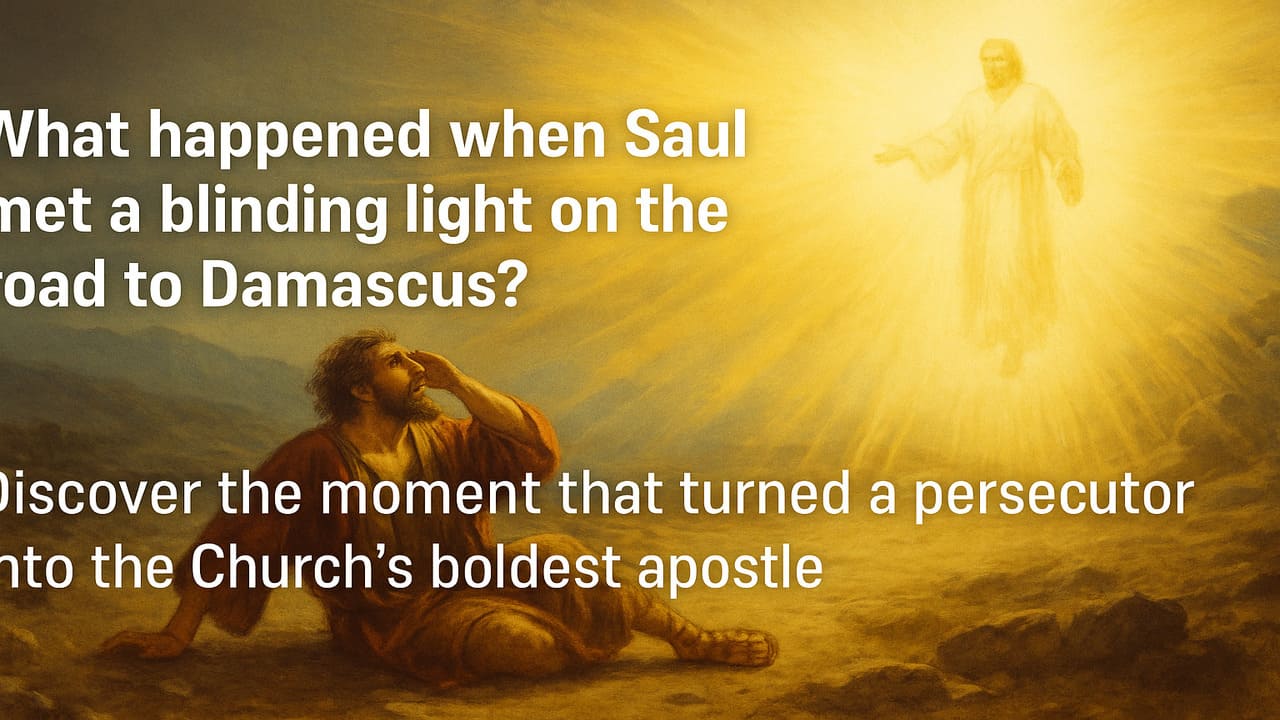
Thorn Ville Church – Among all the dramatic moments recorded in the New Testament, few are as life-altering and as theologically significant as the blinding encounter that took place on the road to Damascus. It wasn’t just a personal turning point for Saul of Tarsus; it marked the beginning of one of the most influential ministries in Christian history. This single event transformed a feared persecutor of the Church into its most fervent apostle Paul.
Saul’s encounter with the risen Christ was not only dramatic in its physical effect, but symbolic of the radical spiritual awakening that would redefine his life. The “blinding” was not merely of the eyes, but also of pride, legalism, and hatred so that Saul might see more clearly than ever before.
Before he became the Apostle Paul, Saul was a feared name among early Christians. A devout Pharisee, Saul was a zealous enforcer of the Jewish law and believed he was doing God’s will by suppressing the followers of Jesus. According to Acts 8:3, Saul “began to destroy the church. Going from house to house, he dragged off both men and women and put them in prison.”
He obtained authority from the high priest to arrest Christians even outside Jerusalem. His next mission: Damascus a city with a growing Christian population. His plan was simple: intimidate, arrest, and return believers to Jerusalem in chains.
Also Read : From Bangkok to Bogotá: Film Production Goes Global
Acts 9 recounts the story in vivid detail. As Saul journeyed near Damascus, a bright light from heaven suddenly flashed around him, and he fell to the ground. Then came a voice:
“Saul, Saul, why do you persecute Me?”
In confusion and fear, Saul responded, “Who are you, Lord?”
The answer shook him to his core:
“I am Jesus, whom you are persecuting.”
The experience left Saul physically blind for three days. But in that darkness, something powerful was happening within him. This blinding encounter dismantled everything Saul thought he knew. The Jesus he believed was dead was very much alive and speaking directly to him.
This was not only a spiritual awakening but a personal commissioning. Jesus did not appear to condemn Saul, but to call him. Saul would no longer be an agent of fear, but a messenger of grace.
In Damascus, God spoke to a disciple named Ananias and told him to visit Saul. Ananias was understandably hesitant he had heard of Saul’s reputation. Yet, obedient to the Lord’s voice, he went.
When Ananias laid hands on Saul and prayed for him, something like scales fell from Saul’s eyes, and he could see again. He was also filled with the Holy Spirit and baptized. This moment symbolized the full restoration not only of his sight but of his identity.
Saul stayed with the disciples in Damascus for several days, and almost immediately began preaching that Jesus is the Son of God. The persecutor had become the preacher.
Also Read : Miracle at Beautiful Gate: The Day a Lame Beggar Walked Again
The transformation of Saul into Paul wasn’t just personal it had ripple effects across the early Church. His conversion served as a testimony that no one was beyond the reach of Christ’s grace. Paul would go on to write the majority of the New Testament epistles, plant churches across the Roman Empire, and articulate the theology of salvation by faith, not works.
His unique background as a Roman citizen and educated Pharisee made him the perfect bridge between Jewish and Gentile audiences. But none of this would’ve been possible without that one blinding encounter.
The story of Saul on the road to Damascus is not just an ancient miracle it’s a message. It tells us that divine intervention often comes when we least expect it, and sometimes in the form we fear most. It reminds us that spiritual transformation may require seasons of darkness, so that deeper vision can be formed.
In a world full of distractions, pride, and misplaced zeal, this story challenges us to ask:
Saul’s moment on the Damascus road is more than a historical footnote; it is an invitation to every heart still seeking meaning in the midst of conviction.
After the blinding encounter, Paul never stopped sharing his story. He referenced it multiple times in Acts 22, Acts 26, and his letters not to center himself, but to magnify the grace of Christ.
His message became simple yet powerful: “Christ Jesus came into the world to save sinners of whom I am the worst.” (1 Timothy 1:15) His life became living proof that even the hardest hearts can be softened, and that true clarity sometimes comes only after we are willing to be broken and blind.
So, while it began with a blinding light on a dusty road, Paul’s journey continues to light the way for millions who seek truth beyond what the eye can see.
Thornville Church - Your Source for Biblical Inspiration - numerous hidden christian heritage sites worth discovering remain off the beaten…
Thornville Church - Your Source for Biblical Inspiration - symbols and artifacts found in early church structures reveal much about…
Thornville Church - Your Source for Biblical Inspiration - The story of Daniel in the Lion’s Den remains a powerful…
Thornville Church - Your Source for Biblical Inspiration - Early christian sacred spaces have left a lasting cultural impact that…
Thornville Church - Your Source for Biblical Inspiration - haunted locations featured horror games have become central to the spine-chilling…
Thornville Church - Your Source for Biblical Inspiration - church symbols and icons hold profound significance in Christian worship, serving…